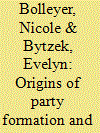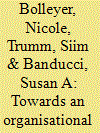| Srl | Item |
| 1 |
ID:
123011


|
|
|
|
|
| Publication |
2013.
|
| Summary/Abstract |
Which new parties entered national parliaments in advanced democracies over the last four decades and how did they perform after their national breakthrough? This article argues that distinguishing two types of party formation (that facilitate or complicate party institutionalisation) helps to explain why some entries flourish, while others vanish quickly from the national stage. New parties formed by individual entrepreneurs that cannot rely on ties to already organised groups are less likely to get reelected to parliament after breakthrough than rooted newcomers. This hypothesis is tested on a newly compiled dataset of new parties that entered parliaments in 17 advanced democracies from 1968 onwards. Applying multilevel analyses, the factors that shape newcomers' capacity to reenter parliament after breakthrough are assessed. Five factors have significant effects, yet affect party performance only in particular phases: both a party's electoral support at breakthrough and its operation in a system with a strong regional tier increase the likelihood of initial reelection. In contrast, a distinct programmatic profile, the permissiveness of the electoral system and easy access to free broadcasting increase a party's chance of repeated reelection. Only formation type significantly affects both phases and does so most strongly, substantiating the theoretical approach used in this article.
|
|
|
|
|
|
|
|
|
|
|
|
|
|
|
|
| 2 |
ID:
120139


|
|
|
|
|
| Publication |
2013.
|
| Summary/Abstract |
Which parties represented in the European Parliament (EP) are able to extract regular donations from their MEPs' salaries and, if they extract donations, how great are they? In the literature on party finances, there has been a lack of attention paid to the use of salaries of elected representatives as a source of funding. This is surprising given that the national headquarters of many parties in Europe regularly collect 'party taxes': a fixed (and often significant) share of their elected representatives' salaries. In filling this gap, this article theoretically specifies two sets of party characteristics that account for the presence of a taxing rule and the level of the tax, respectively. The presence of a tax depends on the basic 'acceptability' of such an internal obligation that rests on a mutually beneficial financial exchange between parties' campaign finance contributions to their MEPs and MEPs' salary donations to their parties. The level of the tax, in contrast, depends on the level of intra-organisational compliance costs and parties' capacity to cope with these costs. Three factors are relevant to this second stage: MEPs' ideological position, the size of the parliamentary group and party control over candidate nomination. The framework is tested through a selection model applied to a unique dataset covering the taxing practices in parties across the European Union Member States.
|
|
|
|
|
|
|
|
|
|
|
|
|
|
|
|